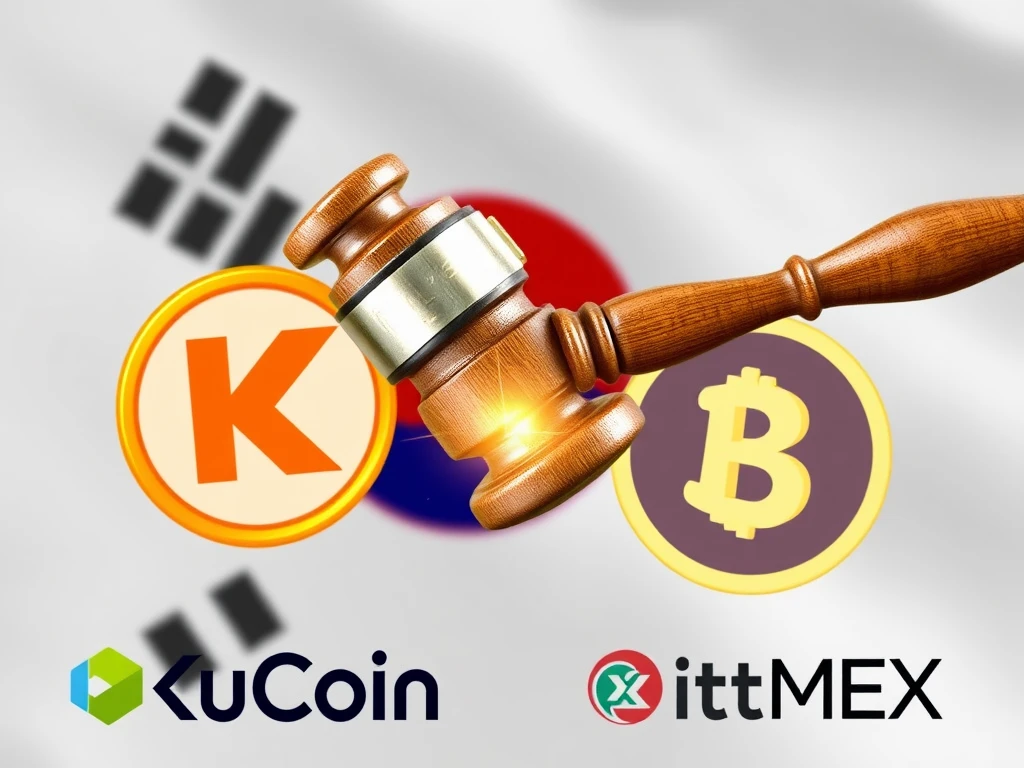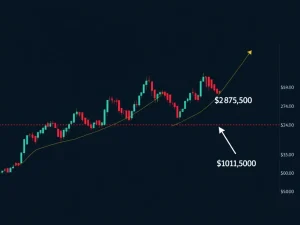Urgent Alert: South Korea’s Stern Crypto Crackdown Eyes KuCoin and BitMEX

In an urgent development for the cryptocurrency world, South Korea is intensifying its regulatory scrutiny, setting its sights on prominent crypto exchanges like KuCoin and BitMEX. The nation’s financial authorities are reportedly cracking down on platforms suspected of operating without proper registration as Virtual Asset Service Providers (VASPs). This move signals a significant escalation in South Korea’s approach to crypto regulation, potentially reshaping the landscape for both domestic and international exchanges operating within its jurisdiction.
South Korea’s Crypto Crackdown: Why Now?
South Korea has long been a major hub for cryptocurrency trading and investment. To ensure market integrity and protect investors, the country’s Financial Intelligence Unit (FIU), under the Financial Services Commission, mandates that all crypto exchanges operating within its borders register as VASPs. This requirement is enshrined in the Specified Financial Information Act, a key piece of legislation designed to bring digital assets under regulatory oversight.
The current crackdown stems from concerns that certain international exchanges have been providing services to South Korean users without adhering to these VASP reporting obligations. This alleged non-compliance has triggered investigations and is now prompting the FIU to consider sanctions, potentially including blocking access to these platforms within South Korea.
Which Crypto Exchanges are in the Crosshairs?
According to local media reports, a list of exchanges is under investigation for allegedly operating without VASP reports. Key names on this list include:
- KuCoin
- BitMEX
- CoinW
- Bitunix
- KCEX
These exchanges are accused of actively targeting South Korean investors through marketing and customer support initiatives without completing the necessary compliance procedures within the country. This alleged oversight has placed them in direct conflict with South Korean financial regulation.
What are the Potential Consequences?
The implications of non-compliance with South Korea’s VASP regulations are severe. Under the country’s laws, any entity involved in crypto sales, storage, brokerage, or management must report to the FIU. Failure to do so is deemed illegal and can result in:
- Criminal penalties
- Administrative sanctions
- Access blocking
An FIU official has confirmed that measures to block access to the listed exchanges are under review. The FIU is currently collaborating with the Korea Communications Standards Commission, the body responsible for internet regulation, to explore effective methods for implementing these access restrictions. This signifies a determined effort by South Korean authorities to enforce their crypto regulation.
Beyond International Platforms: Scrutiny on Domestic Exchanges
The regulatory pressure isn’t limited to international platforms. South Korean crypto exchanges are also facing increased scrutiny. Recently, Bithumb, a major domestic exchange, was raided by prosecutors amid embezzlement allegations against its former CEO. This incident has cast a shadow over the local crypto industry, raising concerns about financial misconduct and compliance within South Korean exchanges.
Furthermore, rumors have surfaced regarding substantial fees allegedly paid to intermediaries for listing projects on prominent South Korean exchanges like Bithumb and Upbit. These allegations, while unverified, highlight the intense competition and potential for questionable practices within the domestic exchange landscape. Upbit has responded by challenging the media to provide concrete evidence of these alleged brokerage fees, indicating the sensitivity of these accusations.
Impact and Future Outlook
South Korea’s assertive stance on crypto exchange crackdown sends a clear message: strict adherence to local regulations is non-negotiable. For international exchanges, this means a critical need to prioritize compliance with VASP requirements if they wish to serve the South Korean market. The potential blocking of platforms like KuCoin and BitMEX could significantly impact their user base and operations in this key crypto market.
For South Korean investors, these developments underscore the increasing regulatory oversight of the crypto space. While intended to protect investors, these measures could also lead to reduced access to certain international platforms and potentially impact trading options. The situation remains fluid, and the crypto community is keenly watching how these regulations will be implemented and what long-term effects they will have on the South Korean and global crypto markets.
As South Korea doubles down on crypto regulation, the industry braces for potential shifts and awaits further clarity on the enforcement actions and their broader implications. This situation serves as a stark reminder of the evolving global regulatory landscape for cryptocurrencies and the critical importance of compliance in this dynamic sector.









